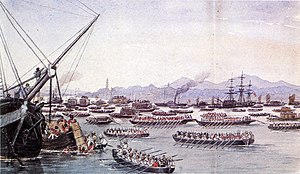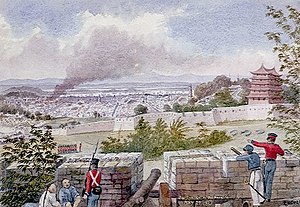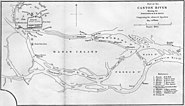The Second Battle of Canton was fought between British and Chinese forces in Canton, China, in May 1841 during the First Opium War.
Background[]
Canton was one of the only ports in China opened to foreign countries, mostly European, for trade. In the early stages of trade, foreign countries needed many things from China, like spice, silk and pottery. On the other hand, China needed fewer objects from these foreign powers. As a result a great trade imbalance was created.
The trade imbalance ended when opium was shipped into China. Many previously well-off Chinese spent their whole fortune on opium, and they worked less and less. The number of people using opium in China grew rapidly, to the point that the trade imbalance shifted in the foreign countries' favour.
Eventually, Chinese officials tried to end the opium trade altogether by destroying a large amount of opium in the Chinese ports. This triggered the First Opium War. In January 1841, the Royal Navy started bombarding Chinese ports near Guangzhou, and successfully created many beachheads. Local Chinese officials were forced to surrender, and signed local peace treaties with the British. When the local officials brought these peace treaties to Beijing they were punished for their failures. Qing refused to acknowledge these peace treaties, neither did they acknowledge any China territories were lost. Instead, they sent in more troops to drive back the British.
Battle[]
On May 21 Chinese forces tried a night ambush on the British positions, but they were repelled. The British continued the bombardment and conquest of Chinese coastal cities.
On May 24 the British started to conquer Guangzhou. They successfully took over Tsinghae. They then took over 4 Chinese cannon forts around the cities. This allowed the British to bombard the city at will. The city surrendered afterwards, paying the British 6 million Chinese dollars at the same time. As a result, Canton was not totally destroyed. But afterwards, many civilians were outraged at the looting by the British.
On May 28 Chinese reinforcements from the other provinces started to retreat out of Canton. At the same time the British also retreated. On May 30 a Chinese civilian army of around 8,000 men attacked the retreating British forces. Major Beecher died to wounds or sickness. The British managed to regroup and strike back at the Chinese. But heavy rainfall came, greatly limiting the British shooting abilities. The Chinese engaged in melee combat with the British, forcing them to retreat. Eventually, Hadfield and his men were trapped and could not make it back to camp. Finally, the British sent reinforcements and helped Hadfield break though. The British reported only 2 men dead, while Chinese civilians reported over 100 British killed. This incident became known as the "San Yuan Li Incident" (三元里事件).
On May 31 the Guangdong governor met with British commander Hugh Gough, and at the same time a civilian army of around 12,000 men arrived from the north. Gough hence concluded that the civilian army was not part of the Qing army. The civilian army departed upon the request from the Guangdong governor. By June 1 all British forces left the Canton area.
Aftermath[]
The "Battle of Canton" had a minor effect on the First Opium War, but it had a major effect on the civilians. This is one of the first times that civilians took matters into their own hands, under the decaying Qing. Stories about this incident started spreading throughout China. The Qing showed in this battle, that they were powerless at stopping the British invasion. At the same time, it was shown that a group of civilians were successful at driving back the British. These stories and rumors led Chinese civilians to begin to believe that forming local armies and militias would be the only successful way to drive out the British, which helped pave the way for the massive rebellions and anti-foreigner movements within the Qing Dynasty later on.
Gallery[]
Notes[]
- Footnotes
- ^ Major-General Hugh Gough reported 45,000 men.[3] Military Secretary Keith Mackenzie reported a minimum to maximum estimate of 31,000 to 56,000.[4]
- Citations
- ↑ Bulletins of State Intelligence (1841). p. 686.
- ↑ MacPherson 1843, pp. 312, 315
- ↑ MacPherson 1843, p. 306
- ↑ Mackenzie, Keith Stewart (1842). Narrative of the Second Campaign in China. pp. 131–132.
References[]
- MacPherson, Duncan (1843). Two Years in China.
External links[]
The original article can be found at Battle of Canton (May 1841) and the edit history here.




